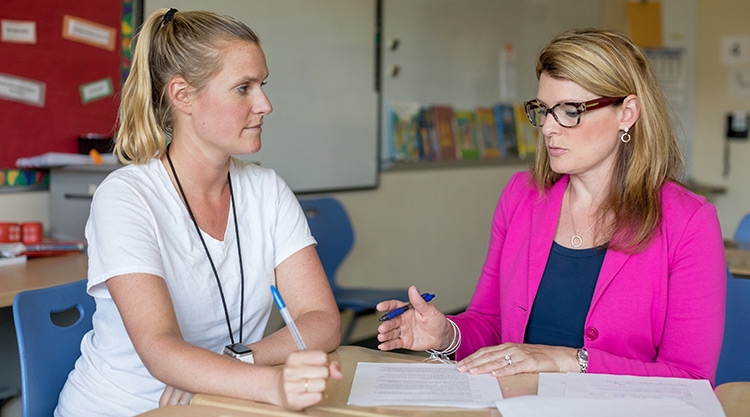
LITERACY EDUCATION
Empower learners and celebrate diversity in a collaborative, inclusive academic community. Blending practice, theory, and research in an online cohesive program, we offer courses, certificates, and a master’s degree for practicing teachers.
Online Master’s of Education (MSEd) in Literacy Education:
- We are excited to now offer an online, 7-week format for certified teachers. With six sessions per year, we allow teachers to begin their program at the most convenient time for them.
- Designed for certified educators.
- State-approved program; leads to Maine’s literacy specialist license (092).
- Learn more: Read about our program requirements, course sequence, and application information .
- This program will prepare students to be eligible for licensure within the State of Maine. Visit the UMS State Authorization and Licensure page to learn more about the licensure requirements in other states and territories, and for contact information to inquire further about the licensure requirements associated with this program.
Certificate of Graduate Study in Literacy Coaching:
- Courses are offered in an online, 7-week format with six sessions per year.
- Designed for experienced literacy educators to develop the knowledge and skills necessary to coach PreK-12 teachers in effective literacy instruction and promote professional learning in schools and districts.
- Students who complete this certificate will be able to develop a vision and goals for a comprehensive literacy program; coach classroom teachers and other school professionals in the literacy curriculum; collaborate with school leaders and teachers to interpret assessment data to inform instruction; advocate for equitable, culturally and linguistically responsive literacy instruction; facilitate integration of digital literacies in support of school goals; and lead professional learning experiences for individuals and groups in support of teacher inquiry and effective decision making.
- Criteria for admission includes successful completion of a master’s degree in literacy or a closely related field and two years of classroom teaching experience.
- Learn more: Read about our program requirements, course sequence, and application information (below).
Certificate of Graduate Study in Literacy Education:
- Courses are offered in an online, 7-week format with six sessions per year.
- Designed for anyone interested in learning more about literacy.
- Interested in earning your master’s in the future? Credits earned through this certificate can be transferred to the online MSEd program.
- Learn more: Read about our program requirements, course sequence, and application information .
Post Master’s Certificate of Advanced Study in Literacy Education:
- Courses are offered in an online, 7-week format with six sessions per year.
- Self-designed program; ideal for classroom teachers, administrators, and other educators.
- Can lead to Maine’s literacy specialist license (092) through appropriate selection of courses.
- Learn more: Read about our program requirements, course sequence, and application information .

TESOL: TEACHING ENGLISH TO SPEAKERS OF OTHER LANGUAGES
The Teaching English to Speakers of Other Languages (TESOL) program offers degrees and certificates that meet the needs of both aspiring and practicing teachers in the state of Maine, elsewhere in the U.S., and abroad. Whether you’re searching for individual courses or you’re interested in completing a degree or certificate program, we offer courses and programs in a variety of formats to serve you where you are. We welcome international students.
Read below to determine which program is right for you.
Master’s Degree Program: Initial Teacher Certification
Degree: Master of Science in Education in Teaching English to Speakers of Other Languages (TESOL): Initial PreK-12 ESL Certification (English as a Second Language)
*The MS Ed. in TESOL, PreK-12 ESL will prepare students to be eligible for licensure within the State of Maine. Visit the UMS State Authorization and Licensure page to learn more about the licensure requirements in other states and territories, and for contact information to inquire further about the licensure requirements associated with this program.
Learn more: Read about our program requirements, course sequence, and application information.
Master’s Degree Program: Advanced Teacher Certification
Degree: Master of Science in Education in Teaching English to Speakers of Other Languages (TESOL)
The MSEd in TESOL for practicing teachers offers two options for program completion:
Accelerated Graduate Pathway Leading to an MSEd in TESOL
The Accelerated TESOL Pathway allows USM undergraduate students with an interest in TESOL to have courses taken in their undergraduate sequence apply toward the MSEd in TESOL. This allows for exposure to education-related courses over multiple years and a reduced course load while in the graduate program.
Students who are pre-service teachers and earning their initial teaching certification/license in a different area as undergraduate students can earn the add-on Maine DOE ESOL Endorsement by completing the MSEd in TESOL program and submitting their paperwork to the Maine DOE.
Certificate of Graduate Study in English as a Second Language
Learn more: Read about our program requirements, course sequence, and application information .
Post-Master’s Certificate of Advanced Study in English as a Second Language
Learn more: Read about our program requirements, course sequence, and application information .
Take the next step
Interested in a degree or certificate program? Apply Now.
Taking one class at a time? Register for courses.

